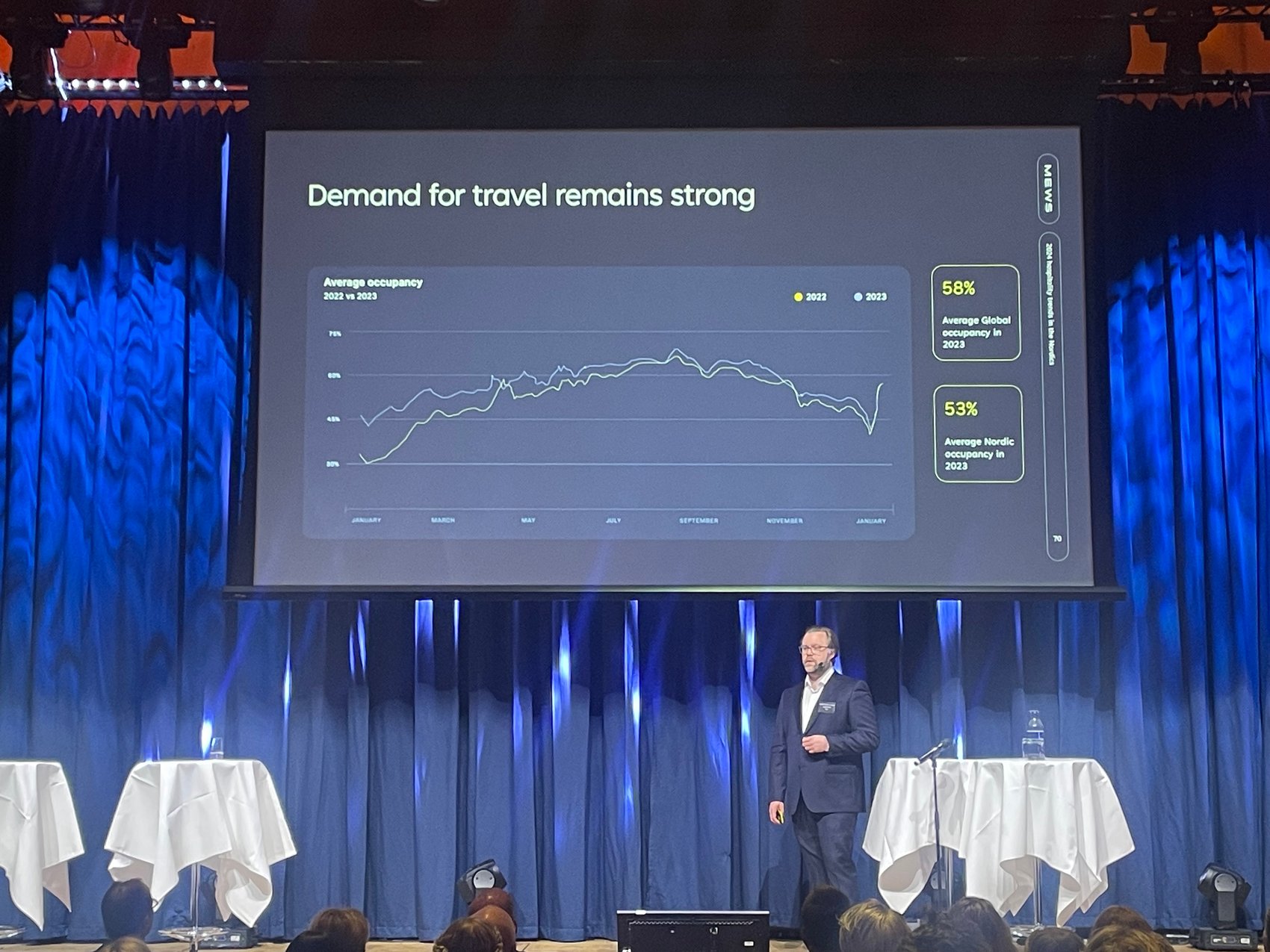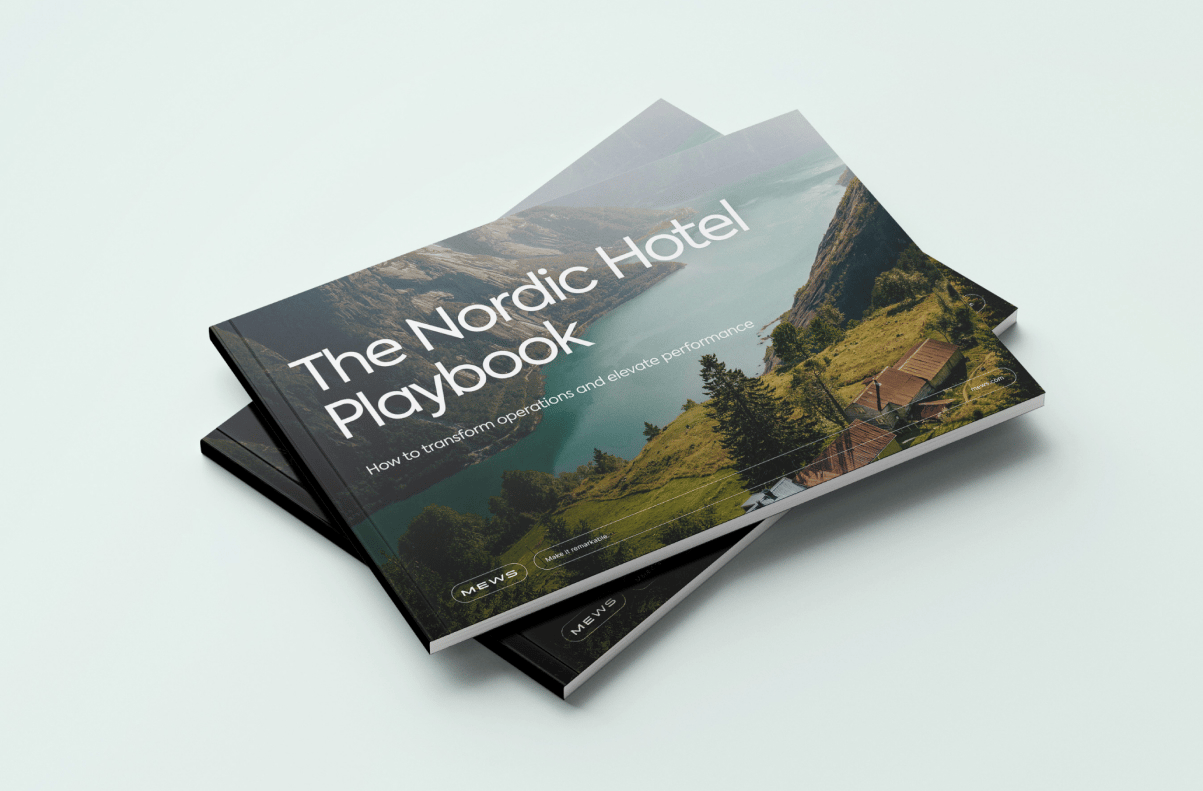The annual Grand Travel Award took place in Stockholm this month, bringing together some of the leading lights in Nordic hospitality. It was the 32nd edition of the awards, and we were honored to get an invitation to speak during the ceremony.
Specifically, we dispatched our CFO, Daniel Ahremark, to explore the latest trends in Nordic hospitality and present our vision for a more connected and dynamic industry. The presentation was a real hit, so we figured we’d share some of the highlights for you – feel free to read the following in Daniel’s soothing voice.

Table of contents
What does the Nordic data say?
The demand for travel in 2023 remained strong. Across the Nordics, average occupancy was 53%, up 4% on 2022. This is similar to the global average of 58%.
Booking lead times increased, with fewer same-day bookings and more reservations made at least 30 days in advance. In other words, travelers' confidence continues to grow.
There’s a big discrepancy between the Nordics and the global average when it comes to flexible reservations. In 2023, the global average of non-refundable bookings was 56%. This is significantly higher than the 23% for the Nordics.
On the one hand, flexibility is good because guests appreciate it. However, the higher global average suggests that Nordic hoteliers have an opportunity to offer more non-refundable rates and generate more guaranteed income.
What’s the story with revenue? Average ADR across the Nordics increased by 7% year-on-year to €123 – tracking exactly the same as the global average. The real success story is RevPAR: the average rose by 19% to €68, which is five percentage points more than the rest of the world.
If you’d like to know more about global data trends in hospitality, download the Mews Data Dive 2023.
Going beyond bedrooms
2024 will be the year that ‘space utilization’ goes mainstream. Why? Because if you only think about selling your hotel rooms, you leave too much potential revenue on the table.
Changing guest habits provide opportunities for hoteliers to keep guests on-property, boosting revenue and loyalty. This is especially true for business guests and digital nomads. Hotels can become a hub for their entire stay, not just a bed to sleep in. When they exercise, it should be in your gym; when they eat, in your restaurant; when they work, in your co-working space or meeting rooms.
Revenue opportunities don’t end there. 2024 will see more hotels branching out into membership options, like weekday parking and co-working spaces, and monthly gym memberships. Plus, options like day-use rooms and weekend pop-up spaces that will boost engagement with the local neighborhood and widen your customer base.
Parking on its own can be a huge earner. Using space management with Mews, one chain hotel in the Nordics earned over €128,000 in 2023 simply by selling their parking spots. But you don’t have to be a big chain to earn big. One boutique hotel in Stockholm earned €60,000 in the same period, through 1,727 parking reservations.
Adopting new success metrics
For all these reasons and more, space utilization is more important than occupancy. In fact, it’s one of the key metrics in our guide to The New Era of Hospitality Metrics for General Managers.
Since 2021 when we launched Mews Spaces, every year has seen a huge increase in total revenue for customers selling additional space types. In 2022 it was a 360% increase; in 2023 there was a 140% increase on top of that. Our projection for 2024 shows a further 170% boost in total revenue.
Another change is shifting the focus from RevPAR to a metric like RevPAG (revenue per available guest). Hotels should (and some already do) measure revenue from all customers at your property, throughout their journey with you, not just revenue per room inventory.
Average RevPAG for 2023 is significantly higher than RevPAR: €138 in the Nordics vs €68. This is no surprise, given it captures upsells and services like F&B, but it paints a more holistic picture of your business.
AI and personal guest experiences
You may be bored of hearing about how AI will change our industry – not because it’s not true, but because the actual details are often lacking. Well, here’s one way it will definitely help hoteliers: enhancing the guest experience.
Utilizing guest data is essential for creating personalized, remarkable experiences. For this, you don’t need more guest data (there’s already more than enough); you just need to access it more intelligently.
AI can do this far more efficiently than any person. It can generate custom recommendations based on guest profiles and gives you the ability to prioritize and reward your most loyal guests. Our customers will soon be able to implement this as we recently acquired Nomi, an AI recommendation tool.
AI and dynamic pricing across spaces
Specialist revenue management solutions have been using dynamic pricing for rooms for years. But now, as hoteliers can connect their services and data more cohesively, it’s time to extend dynamic pricing to all your hotel services.
Parking, bicycle rental, co-working, spas and gyms... AI can help you maximize revenue in every space you sell. Take breakfast, for instance. With a digital breakfast list (yes, available through Mews), you could recommend times based on busy periods, charge for peak times and offer behavioral-based pricing. This can be based on guest profile and preferences (e.g. corporate travel vs. family holiday) or be applied to locals dining in your breakfast space.
AI tools are readily available. In Mews Marketplace, we have over 25 AI integrations that you can connect to.
2024 promises to be a transformative year for hospitality. If you haven’t begun already, it’s time to start future proofing your tech stack – and that begins with Mews.

Author
Tom Brown
When Tom isn't creating outstanding marketing content for Mews, he writes fiction for himself. Either way, he only uses the best words.
Hospitality hot takes straight to your inbox
Sign up to our monthly newsletter for industry insights, product news, partner updates and more.

The Nordic Hotel Playbook
Download now


.webp)